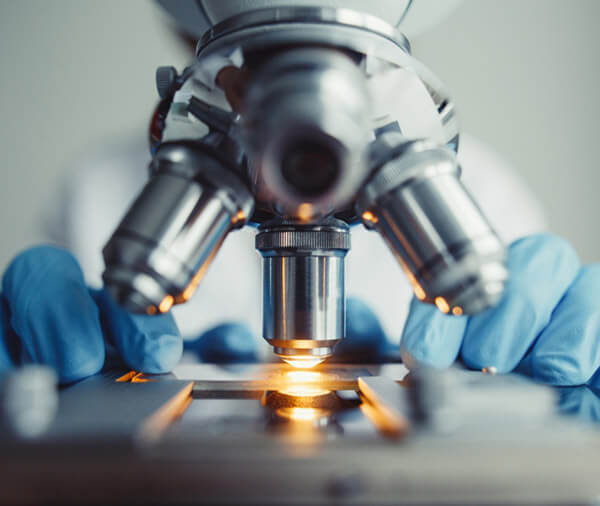
26 YEARS CLOSER TO A CANCER FREE FUTURE
Thanks to our supporters, investment in research has helped increase survival rates.
In the 1980s, the cancer survival rate was less than 50%. Today, 7 in 10 Australians will survive for at least five years after a cancer diagnosis and for some cancer types, survival is more than 90%. Since 1999, death rates for all cancers combined have fallen by around one third.
Thanks to improvements in cancer prevention, early detection, treatment and care over the past 25 years more than 157,000 Australian lives were saved.
Here are some of the many milestones and achievements in cancer research and control since the first POSH Ball held in April 2000.

2003
- The human genome (DNA) is mapped, informing new approaches to cancer research

2006
- Phase-in of National Bowel Cancer Screening Program commences, following Cancer Council advocacy
-
First ever national SunSmart campaign run by Australian Government, citing Cancer Council research and analysis. Since 2006, melanoma mortality in Australians aged 50 to 75 have fallen by 40%, largely through prevention.

2007
- Australia becomes the first country in the world to roll out a free National HPV Vaccination Program. Development of the vaccine was spearheaded by Prof Ian Frazer AC

2008
- Cancer Council successfully advocates for liquid nicotine for vaping to be a restricted substance due to concerns about addictiveness, toxicity and smoking uptake

2009
- With funding from Cancer Council NSW, Prof Anna deFazio AM and her team identified two distinct mechanisms that lead to treatment failure in the most common type of ovarian cancer. Prof deFazio has taken these findings, and those from two further Cancer Council NSW grants, to clinical practice through a new translational research program
- Australian Government commits $640 million to regional cancer centres, citing research submitted by Cancer Council and the Clinical Oncology Society of Australia

2010
- BreastScreen Australia switches from analogue to digital mammography, following Cancer Council research and analysis.

2011
- Australia became the first country in the world to introduce tobacco plain-packaging legislation, reducing smoking prevalence by 25% in its first two years

2013
- Australian Government commits to completing bowel cancer screening program by 2020, citing Cancer Council research

2015
- With funding from Cancer Council NSW, Prof Murray Norris AM and his team created the ‘Minimal Residual Disease’ model, a tool that can detect traces of residual cancer cells in children suffering with acute lymphoblastic leukaemia (ALL). The test, with appropriate follow up treatment, has halved the relapse rate in high risk children. It is now “standard of care” for children diagnosed with ALL – nationally and internationally

2017
- Underpinned by Cancer Council NSW research, the new National Cervical Screening Program was introduced, transitioning from two-yearly Pap tests to five-yearly HPV screening tests

2018
- Australian Government funds first ever national mass media campaign to promote bowel cancer screening, citing Cancer Council research estimating potential lives saved
- Australian Government commissions Cancer Council to produce first ever roadmap to risk-adjusted breast cancer screening, a potential global gamechanger

2019
- Australian Government commissions Cancer Council to
develop first ever plan and guidelines to
reverse unprecedented increase in liver cancer death rates
2020
- WHO launches global strategy for the elimination of cervical cancer, based on Cancer Council’s Daffodil Centre-led research
- Box Rallies funded researcher, Prof Nicholas Gottardo, identifies new immunotherapy approach for hard-to-treat neuroblastoma in children, helping to decrease the harmful long-term effects of radiation therapy.
2021
- The Daffodil Centre, a world-leading research centre on cancer control and policy (joint venture of Cancer Council NSW and the University of Sydney) is launched
2022
- Daffodil Centre publishes 35-year study showing optimal care at multiple disease stages is the likely driver of improved prostate cancer survival outcomes
- Box Rallies funded researcher, A/Prof Pilar Blancafort, designed a targeted peptide, which is already showing potential for translation to clinical trials in combination with existing therapeutics for hard-to-treat breast cancers
2023
- Daffodil Centre delivers independent, NHMRC-approved recommendations to expand bowel cancer screening to people aged from 45
- Australian Government announces plan to be the first country to eliminate cervical cancer, informed by Daffodil Centre research by Prof Karen Canfell and her team
- University of Queensland and Daffodil Centre commence work on first ever guidelines for identifying people at elevated pancreatic cancer risk and with operable disease
- Box Rallies reaches $40m raised for cancer research
- The Fussell Family Foundation commits to expanding support and scope for Cancer Council NSW’s ovarian cancer research stream
2024
- Cancer Council research informs government policies aimed at protecting young people from risk of smoking uptake linked to vaping
- Cancer Council NSW commences scoping to establish a Centre for Survivorship Research in collaboration with UNSW to grow the evidence base to inform change for ongoing care of cancer survivors
2025
- National Lung Cancer Screening Program to commence informed by research led by Cancer Council NSW


